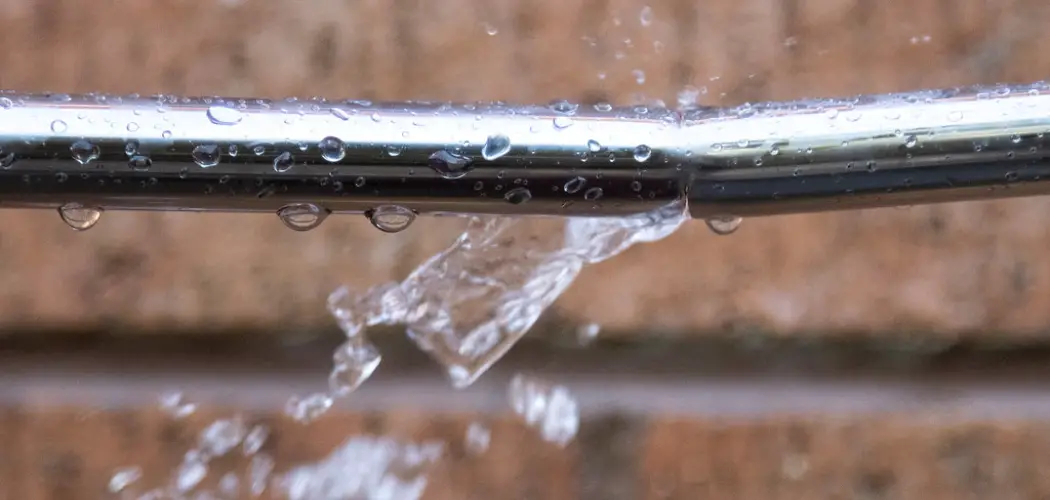Are you wondering if something is wrong with your plumbing? A burst pipe can be a nightmare and cost a lot of money to repair. If you are worried that something like this might have happened in your home, it is important to know what signs to look for so that you can properly diagnose the problem and get on the same page as your plumber or handyman.
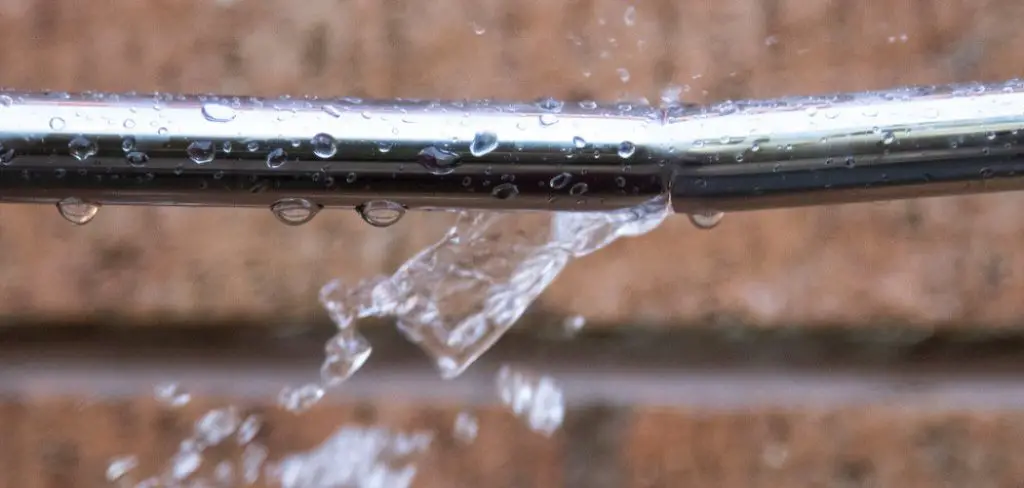
In this blog post on how do you know if your pipe burst, we will explore some of the most common tell-tale signs of a burst pipe and help provide guidance on how best to address the issue quickly and effectively. Keep reading to find out more!
Needed Materials
First things first, let’s talk about the tools and materials you will need:
- A Flashlight
- Protective Gear (Gloves, Safety Glasses, Etc.)
- Towels or Rags
- A Bucket
- Wrenches or Pliers
- Caulk or Sealant (in Case of Minor Leaks)
- Pipe Tape (for a Temporary Fix)
- A Plumber or Handyman (for More Severe Cases)
11 Step-by-step Guidelines on How Do You Know if Your Pipe Burst
Step 1: Check Your Water Meter
The first sign that your pipe may have burst is your water meter running continuously even when all the faucets are turned off. If this is the case, it means water is being lost somewhere along the way, and you could very well be dealing with a burst pipe. You can also try turning off the main water supply to your home and checking if the meter still runs. If it does, then you definitely have a burst pipe on your hands.
Step 2: Listen for Unusual Noises
If you hear unusual noises coming from your pipes, such as gurgling or bubbling sounds, this could be a sign of a burst pipe. These noises are caused by air pockets forming in the pipes due to decreased water pressure, which is a common symptom of a burst pipe.
You may also hear dripping or rushing water sounds, which is a more obvious sign of a burst pipe. It is important to pay attention to these sounds and investigate further.
Step 3: Look for Visible Signs of Water Damage
Visible signs of water damage, such as wet spots on walls or ceilings, peeling paint or wallpaper, or warped floorboards are all indications that water is leaking from somewhere. If you notice any of these signs, it is important to try and locate the source of the leak. A burst pipe is a likely culprit in these situations.
Step 4: Check Areas with Exposed Pipes
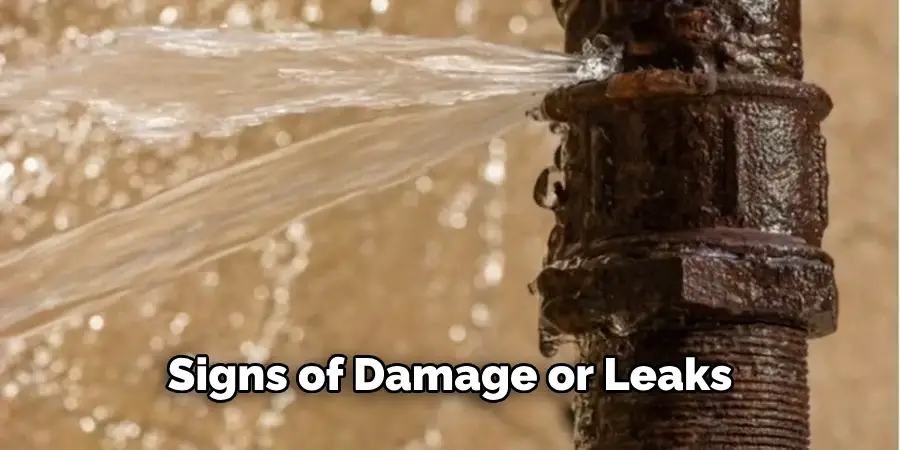
If you have any exposed pipes in your home, such as in a basement or crawl space, it is important to regularly check them for signs of damage or leaks. Look for cracks, rust, or bulging areas on the pipes, which can be a sign of a burst pipe.
This is especially important to do during the winter months when pipes are more susceptible to freezing and bursting. It is also a good idea to insulate these pipes to prevent them from freezing and bursting in the first place.
Step 5: Inspect Your Water Quality
If your water suddenly becomes discolored, smells unusual, or has an odd taste, this could be a sign of a burst pipe. When pipes burst, it can cause sediment and rust to enter your water supply, resulting in changes to its appearance and quality. If you notice any of these changes, it is important to stop using the water immediately and call a plumber for assistance.
Step 6: Check Your Water Pressure
A sudden decrease in water pressure can also be an indication of a burst pipe. If you notice that your shower has lost pressure or your faucet is only trickling water, it is important to investigate further.
This can be a sign that there is a leak somewhere in your plumbing system, and a burst pipe may be the culprit. You can also try turning off the main water supply and checking for any changes in pressure. It is important to address this issue promptly to prevent further damage and costly repairs.
Step 7: Smell for Musty or Damp Odors
If you notice any musty or damp odors in your home, this could be an indication of water leaking from a burst pipe. Water that seeps into walls, floors, or ceilings can cause mold and mildew to grow, resulting in these unpleasant odors. If you notice these smells, it is important to locate the source of the leak and take action immediately.
Step 8: Check Your Hot Water Tank
If you have a burst hot water pipe, your hot water tank may also show signs of damage. Look for leaks around the tank or any unusual noises coming from it, such as popping or cracking sounds.
If you notice any of these signs, it is important to turn off your hot water supply and call a plumber for assistance. However, if your hot water tank is older and showing signs of wear and tear, it may be time for a replacement.
Step 9: Monitor Your Water Bills
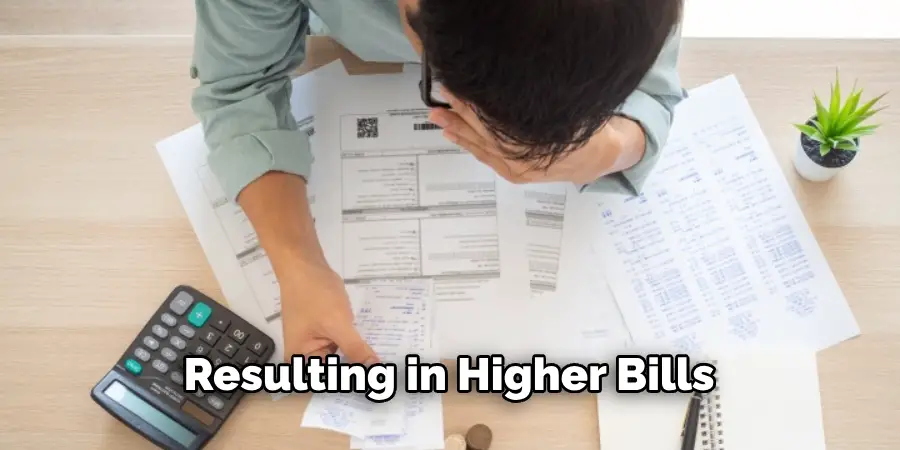
If you see a sudden increase in your water bills without any change in your water usage, this could be a sign of a burst pipe. A leaky pipe can waste significant amounts of water, resulting in higher bills.
If you notice a significant increase, it is important to investigate further and call a plumber if necessary. This will not only save you money but also prevent further damage to your home.
Step 10: Conduct Regular Maintenance
Regular maintenance of your plumbing system can help prevent burst pipes from occurring in the first place. This includes insulating pipes, checking for leaks or damage, and having a professional plumber inspect your system regularly. Prevention is key in avoiding expensive and inconvenient burst pipe situations.
Step 11: Call a Professional
If you have followed all of these steps and are still unsure if your pipe has burst, it is important to call a professional plumber for assistance. They have the necessary tools and expertise to help diagnose and fix burst pipes quickly and effectively. Always remember, that addressing a burst pipe as soon as possible can save you time and money, and prevent further damage to your home.
Following these guidelines on how do you know if your pipe burst can help you identify a burst pipe and take appropriate action promptly. Remember to always prioritize your safety and call a professional if necessary.
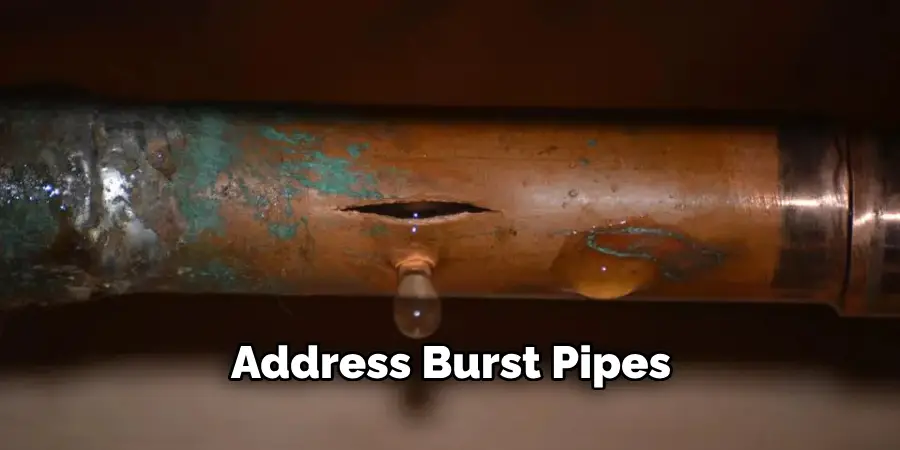
Don’t wait until it’s too late – address burst pipes as soon as possible to avoid further damage and costly repairs. And now that you know how to identify a burst pipe, stay vigilant and prepared for any potential plumbing issues.
So, in answer to the question “How do you know if your pipe has burst?”, follow these steps and trust your instincts. Prevention and quick action are key to dealing with a burst pipe effectively. Stay safe and be proactive in maintaining your plumbing system! Keep an eye out for any signs of a burst pipe and don’t hesitate to call a professional when needed.
Tips to Consider
- Regularly Check Your Plumbing System for Signs of Damage or Leaks
- Insulate Exposed Pipes to Prevent Freezing and Bursting
- Monitor Your Water Bills for Any Sudden Increases
- Conduct Regular Maintenance and Inspections by a Professional Plumber
- If You Suspect a Burst Pipe, Turn Off the Main Water Supply and Call a Plumber Immediately. Don’t Try to Fix It Yourself as It Could Be Dangerous and Cause Further Damage. Stay Safe and Prioritize Your Well-being.
- When Dealing With a Burst Pipe, Remember to Also Check for Water Damage in Surrounding Areas and Take Appropriate Action to Prevent Mold Growth. Always Address the Root Cause of the Problem, Not Just the Visible Signs.
- Educate Yourself on How to Properly Shut Off Your Main Water Supply in Case of Emergencies.
- Act Quickly and Don’t Wait for the Problem to Escalate. c on Can Save You Time, Money, and Stress in the Long Run. Prevention is Key! Don’t Neglect Your Plumbing System and Stay on Top of Any Potential Issues. Stay Informed and Proactive to Avoid Dealing With Burst Pipes in the Future.
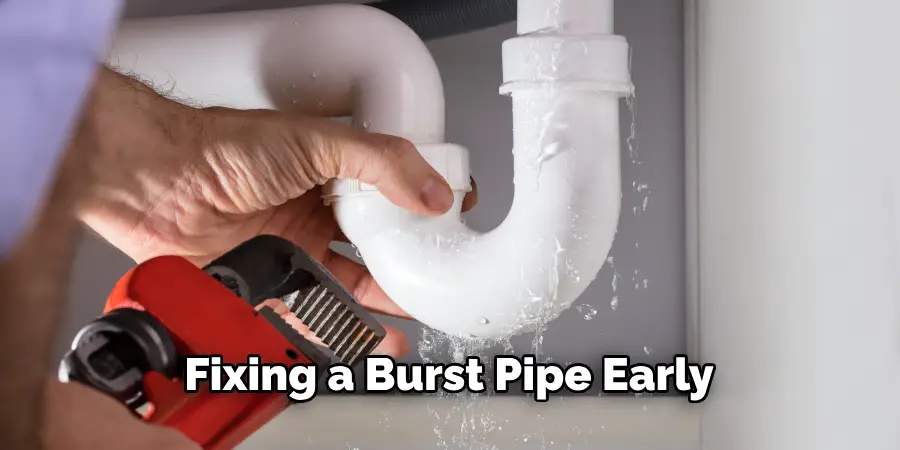
Frequently Asked Questions
Q1: What Should I Do if I Suspect a Burst Pipe in My Home?
A1: If you suspect a burst pipe, it is important to turn off your main water supply and call a professional plumber for assistance. They will be able to locate the source of the leak and provide necessary repairs.
Additionally, you can follow steps such as listening for unusual noises, checking for visible signs of water damage, and monitoring your water quality to help confirm a burst pipe.
Q2: Can a Burst Pipe Be Prevented?
A2: While some instances of burst pipes may be out of our control, there are steps that can be taken to prevent them. Regular maintenance and inspections of your plumbing system, especially during colder months, can help identify and address potential issues before they become larger problems. Insulating exposed pipes can also help prevent them from freezing and bursting.
Q3: Can a Burst Pipe Cause Serious Damage?
A3: Yes, a burst pipe can cause significant damage to your home if not addressed promptly. Water leaking from a burst pipe can lead to mold growth, structural damage, and even electrical issues. It is important to act quickly and call a professional for assistance when dealing with a burst pipe.
Q4: How Do I Know if My Home Insurance Covers Burst Pipes?
A4: It is important to check your home insurance policy or contact your insurance provider to see what coverage you have for burst pipes. In some cases, basic policies may not cover damage caused by burst pipes. It may be worth considering adding additional coverage or upgrading your policy to ensure you are protected in the event of a burst pipe.
Overall, it is crucial to regularly maintain and inspect your plumbing system to avoid any potential issues and minimize the risk of damage from burst pipes. Stay informed and take action promptly if you suspect a burst pipe in your home!
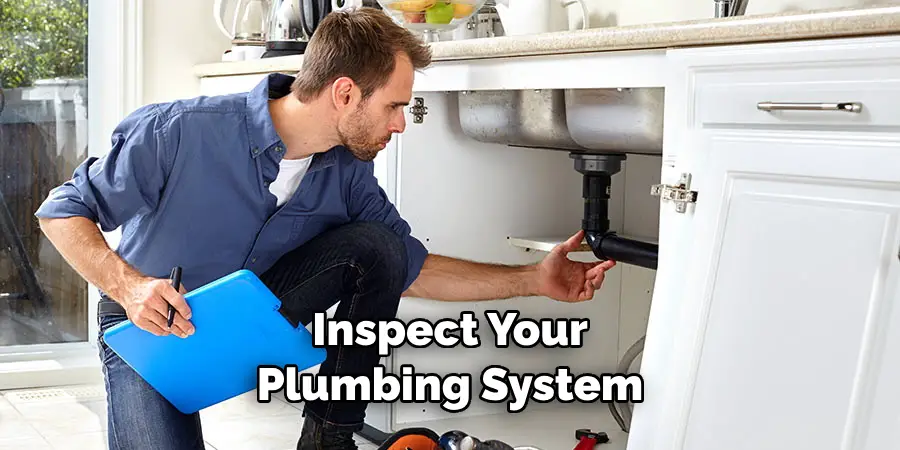
Conclusion
In conclusion, if you think your pipes have frozen or burst because of the cold winter season, your first step should be to shut off the main line to prevent further water damage. From there, check for signs of a burst pipe such as low water pressure, leaks above the visibly frozen pipes, and frost appearing along the lines and the walls.
Also, make sure to contact your local plumber and insurance company just in case any damage has been done. Taking these measures can help to prevent flooding within your home and provide assurance that even during frigid temperatures, your family is safe from harm.
So don’t hesitate – if you suspect that a pipe has frozen or burst due to cold weather, take quick action today! Thanks for reading this article on how do you know if your pipe burst.

